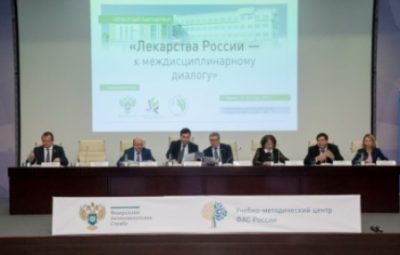The Fourth Partnering “Russian Medicine. An interdisciplinary dialogue” took place in Kazan. This annual event, hosted by the Federal Antimonopoly Service, Health Ministry of Kazan, and the Association of the Russian Pharmaceutical Manufacturers, brought together over 200 people, of which representatives of industry companies, and state agencies.
At the opening speech the Head of the department of control of the trade of the Federal Antimonopoly Service, Timphey Nizhegorodtsev said the roadmap for drug provision of people is being discussed in the Government. Minister of Health of Kazan, Adel Vafin noted that that the increase of the shear of domestically produced medicines in public procurement is successfully increasing. This was a state priority and it was effectively implemented by the Government and business. If back in 2013 the shear of domestically produced medicines was 33% now its 72%.
Mr. Nizhegorodtsev gave a presentation on the key proposals of his agency to improve the system of drug provision. Particularly, he mentioned the importance to establish the concept of interchangeability as the only mechanism to decrease prices on medicines. The experience of the Eurasian countries where members of the industry design a list of interchangeable drugs could be useful. Despite the fact that prices of medicines in Russia are lower than in referred countries there are few exceptions. The FAS suggests those producers that have higher prices to use the opportunity of price preregistration. The FAS also changed its mechanism of inclusion of medicines in the List of Essential Drugs (ZNVLP). Now the committee has work permanently to evaluate not more than five medicines per one one meeting. These committees should also have representatives of manufacturing companies.
Deputy head of the FAS Office for Combating cartels, Olga Franzkevich spoke about violations in PPLs. Thus, there were identified over 3000 violations at trades in 80 regions of Russia in the past year. She remained that violation at PPL not only lead to financial penalties but also to up to 20 years of imprisonment.
A lot of discussions happened took place on the topic of issuing of the certificate on the origin of a medicine (CT-1) a part of Order 1289. ARPM Director General, Victor Dmitriev noted that recently there has been made an amendment into the procedure of issuing the certificate which leads to the increase of time taking to receive the certificate. Head of the TPP Department issuing the certificate, Sergey Rodionov and Head of the Department of the legal support of foreign economic activities of the CCI, Anatoliy Mayancev gave certain clarifications on the procedure of issuing the certificate. Manufacturers are concerned with how long the certificate is effective for the medicines that were only packed in Russia. The answer is that the certificate for those medicines will last until the end of 2016.
Mr. Mayancev spoke about other new legislations regarding the CT-1 certificate. If when making a purchase of medicines a company can not receive a certificate from the producer, they can get a copy from the local CCI branch. It is also possible to verify the certificate online. Mr. Dmitriev asked to present the list of all certificates that have been issued. This way, companies would be able to refer to this list when they apply for PPL instead of presenting the actual certificate.
"Every document is open for changes. All questions arising today will be formulated and forwarded to the appropriate federal authorities. We are confident that today’s productive meeting is not the last one, and in will meet again in Kazan with the new questions and suggestions at the Fifth Partnering,” — concluded Mr. Dmitriev.
ARPM would like to thank organizers and participants and invites partners for participating in the Fifth Partnering in September 2017.

